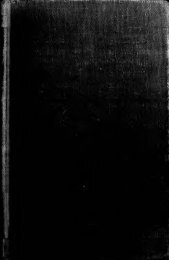Ecclesiastes - GA Barton - 1908.pdf
Ecclesiastes - GA Barton - 1908.pdf
Ecclesiastes - GA Barton - 1908.pdf
You also want an ePaper? Increase the reach of your titles
YUMPU automatically turns print PDFs into web optimized ePapers that Google loves.
58<br />
ECCLESIASTES<br />
WISDOM. QOHELETH.<br />
2 7 . Let us fill ourselves with 9 7 . Drink<br />
thy wine with a glad<br />
costly wine and ointments, and let heart,<br />
no flowers of spring pass us by.<br />
2. Let us crown/ourselves with 9. At all times let thy garments<br />
rosebuds before they be withered. be white, and let not oil be lacking<br />
for thy head.<br />
2 9 . Let none of us be without a 3 22 . For that is his portion,<br />
share in ^ur wanton revelry, every- 5 18 . For that is his lot.<br />
whepe let us leave tokens of our 9 8 . For it is thy lot in life,<br />
mifth, for this is our portion and<br />
this is our lot.<br />
As Qoheleth is the only Jewish writer known to us who cham-<br />
pions such sentiments, there can be little doubt that this polemic<br />
is directed against him. It is true that in the following verses the<br />
author of Wisdom denounces oppressions which Qoheleth nowhere<br />
countenances and couples them with these false doctrines; that<br />
does not, however, prove that his shafts are not aimed at Qoheleth,<br />
for it has in all ages been one of the methods of theological warfare<br />
to hold the opinions of heretics responsible for the most immoral<br />
practices.<br />
13.<br />
DATE AND AUTHORSHIP.<br />
It has been shown above (5) that the Solomonic authorship of<br />
<strong>Ecclesiastes</strong>, denied by Luther in the sixteenth century, and by<br />
Grotius in the seventeenth, was in the nineteenth century demonstrated<br />
by scholarly interpreters to be impossible. The fact that<br />
Solomon is not the author, but is introduced in a literary figure, has<br />
become such an axiom of the present-day interpretation of the<br />
book, that no extended argument is necessary to it. prove No one<br />
at all familiar with the course of religious thought in Israel, as sci-<br />
entific historical study has accurately portrayed it, could for a<br />
moment ascribe the work to Solomon. The language of the book<br />
also strongly reinforces the argument drawn from the thought. It<br />
belongs to the latest stage of linguistic development represented in<br />
the Old Testament. As shown above (10) not only are older<br />
Hebrew forms and constructions changed or confused, but late<br />
developments kindred to those of the Mishna are present, Aramaic





